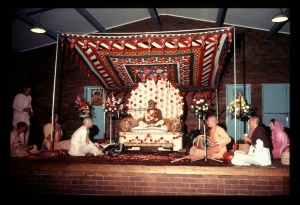CC Adi 12.12: Difference between revisions
No edit summary |
(Vanibot #0054 edit - transform synonyms into clickable links, which search similar occurrences) |
||
| Line 17: | Line 17: | ||
<div class="synonyms"> | <div class="synonyms"> | ||
''dhānya-rāśi'' | ''[//vanipedia.org/wiki/Special:VaniSearch?s=dhānya&tab=syno_o&ds=1 dhānya]-[//vanipedia.org/wiki/Special:VaniSearch?s=rāśi&tab=syno_o&ds=1 rāśi]'' — heaps of paddy; ''[//vanipedia.org/wiki/Special:VaniSearch?s=māpe&tab=syno_o&ds=1 māpe]'' — measures; ''[//vanipedia.org/wiki/Special:VaniSearch?s=yaiche&tab=syno_o&ds=1 yaiche]'' — as it is; ''[//vanipedia.org/wiki/Special:VaniSearch?s=pātnā&tab=syno_o&ds=1 pātnā]'' — useless straw; ''[//vanipedia.org/wiki/Special:VaniSearch?s=sahite&tab=syno_o&ds=1 sahite]'' — with; ''[//vanipedia.org/wiki/Special:VaniSearch?s=paścāte&tab=syno_o&ds=1 paścāte]'' — later; ''[//vanipedia.org/wiki/Special:VaniSearch?s=pātnā&tab=syno_o&ds=1 pātnā]'' — useless straw; ''[//vanipedia.org/wiki/Special:VaniSearch?s=uḍāñā&tab=syno_o&ds=1 uḍāñā]'' — fanning; ''[//vanipedia.org/wiki/Special:VaniSearch?s=saṁskāra&tab=syno_o&ds=1 saṁskāra]'' — purification; ''[//vanipedia.org/wiki/Special:VaniSearch?s=karite&tab=syno_o&ds=1 karite]'' — to do. | ||
</div> | </div> | ||
Latest revision as of 18:20, 19 February 2024

A.C. Bhaktivedanta Swami Prabhupada
TEXT 12
- dhānya-rāśi māpe yaiche pātnā sahite
- paścāte pātnā uḍāñā saṁskāra karite
SYNONYMS
dhānya-rāśi — heaps of paddy; māpe — measures; yaiche — as it is; pātnā — useless straw; sahite — with; paścāte — later; pātnā — useless straw; uḍāñā — fanning; saṁskāra — purification; karite — to do.
TRANSLATION
Paddy is mixed with straw at first, and one must fan it to separate the paddy from the straw.
PURPORT
This example given by Kṛṣṇadāsa Kavirāja Gosvāmī is very appropriate. In the case of the Gauḍīya Maṭha members, one can apply a similar process. There are many disciples of Bhaktisiddhānta Sarasvatī Ṭhākura, but to judge who is actually his disciple, to divide the useful from the useless, one must measure the activities of such disciples in executing the will of the spiritual master. Bhaktisiddhānta Sarasvatī Ṭhākura tried his best to spread the cult of Śrī Caitanya Mahāprabhu to countries outside India. When he was present he patronized the disciples to go outside India to preach the cult of Śrī Caitanya Mahāprabhu, but they were unsuccessful because within their minds they were not actually serious about preaching His cult in foreign countries; they simply wanted to take credit for having gone to foreign lands and utilize this recognition in India by advertising themselves as repatriated preachers. Many svāmīs have adopted this hypocritical means of preaching for the last eighty years or more, but no one could preach the real cult of Kṛṣṇa consciousness all over the world. They merely came back to India falsely advertising that they had converted all the foreigners to the ideas of Vedānta or Kṛṣṇa consciousness, and then they collected funds in India and lived satisfied lives of material comfort. As one fans paddy to separate the real paddy from useless straw, by accepting the criterion recommended by Kṛṣṇadāsa Kavirāja Gosvāmī one can very easily understand who is a genuine world-preacher and who is useless.